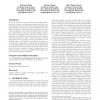Free Online Productivity Tools
i2Speak
i2Symbol
i2OCR
iTex2Img
iWeb2Print
iWeb2Shot
i2Type
iPdf2Split
iPdf2Merge
i2Bopomofo
i2Arabic
i2Style
i2Image
i2PDF
iLatex2Rtf
Sci2ools
167
click to vote
SIGCOMM
2009
ACM
2009
ACM
Opportunistic forwarding in workplaces
So far, the search for Opportunistic Network (ON) applications has focused on urban/rural scenarios where the combined use of mobility and the store-carry-and-forward paradigm helpfully recovers from network partitions and copes with node sparsity. This paper explores the chance of using ONs in workplaces, where the node distribution is denser, thus contributing to reduce the message delivery latency, and where we still find similar needs for informal and unplanned network platforms to support human social relationships and interactions. Both a survey and trace recording experiments have been used to support the analysis of this mobility setting. The ability of recording very short contact times (i.e. lasting few seconds) allowed to interestingly show the slightly different role the social relationships play in dense scenarios and how the large amount of contacts (both short and long), occurring in densily populated spaces, actually contribute to reduce the message-delivery latency ...
Communications | Message Delivery Latency | Opportunistic Networks | SIGCOMM 2009 | Social Relationships |
Related Content
| Added | 28 May 2010 |
| Updated | 28 May 2010 |
| Type | Conference |
| Year | 2009 |
| Where | SIGCOMM |
| Authors | Sabrina Gaito, Elena Pagani, Gian Paolo Rossi |
Comments (0)

